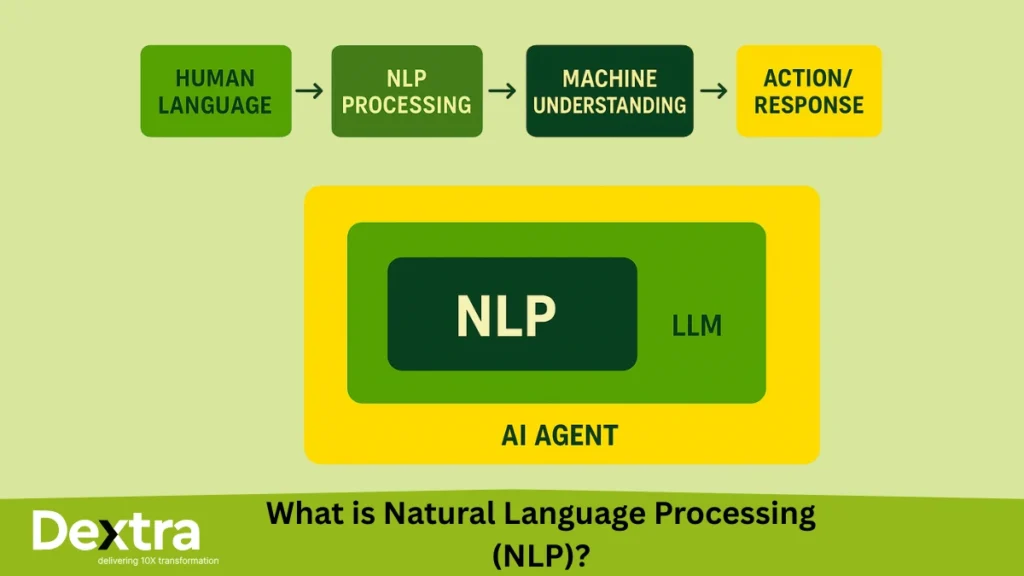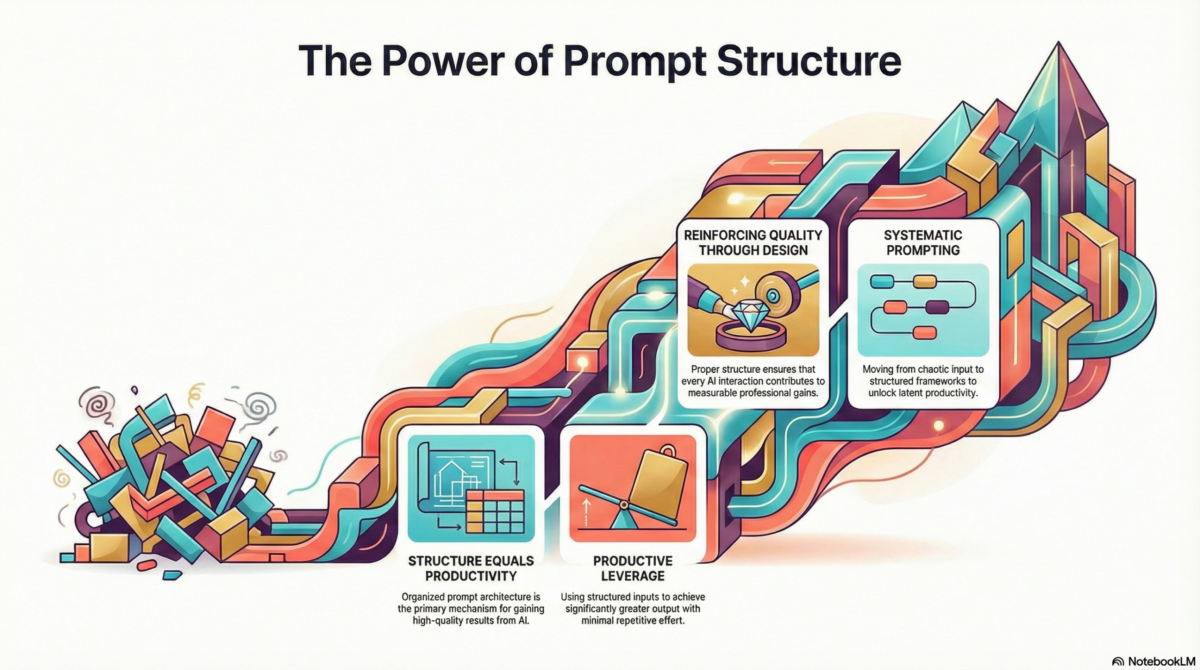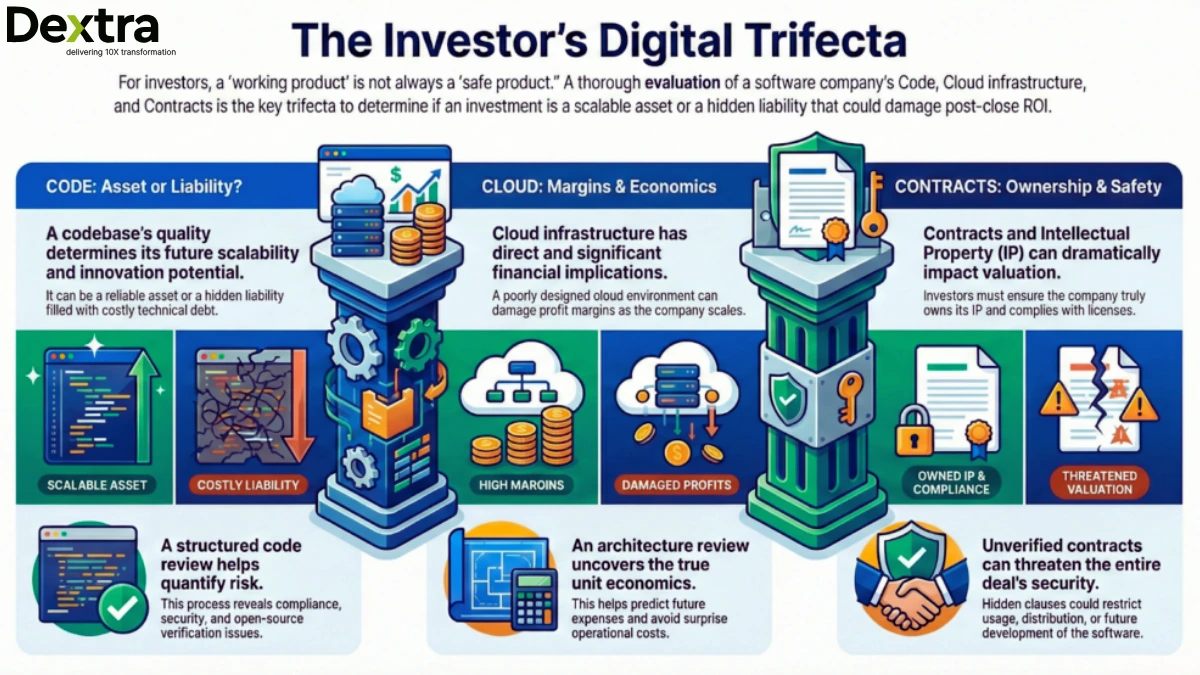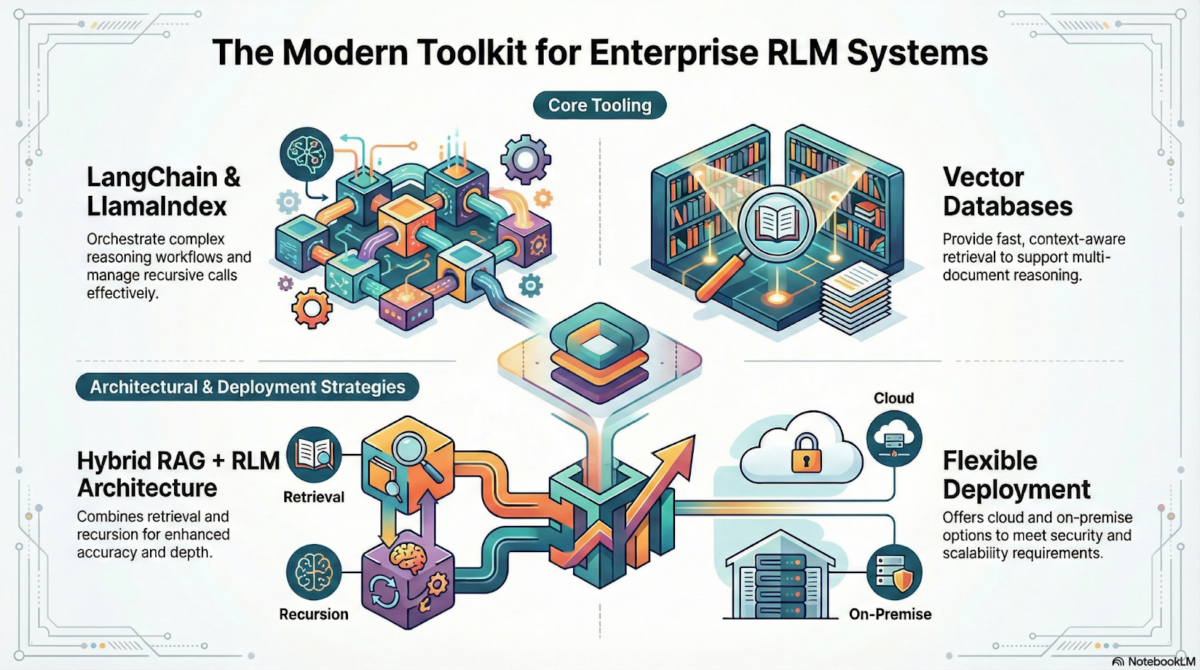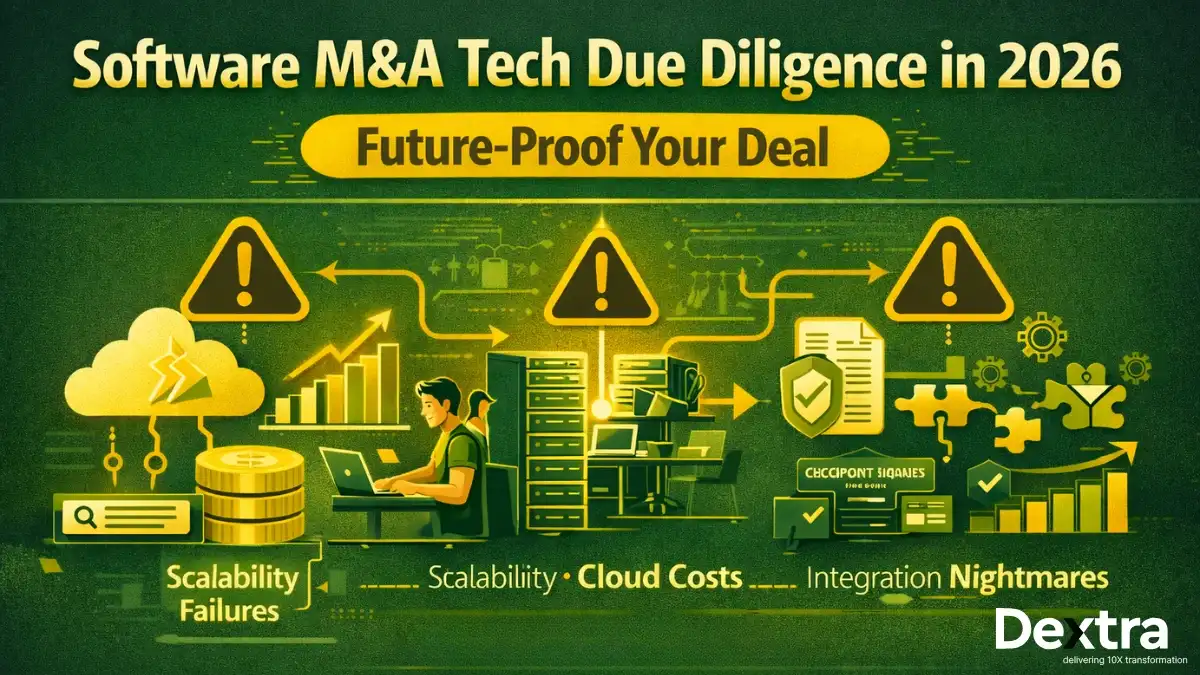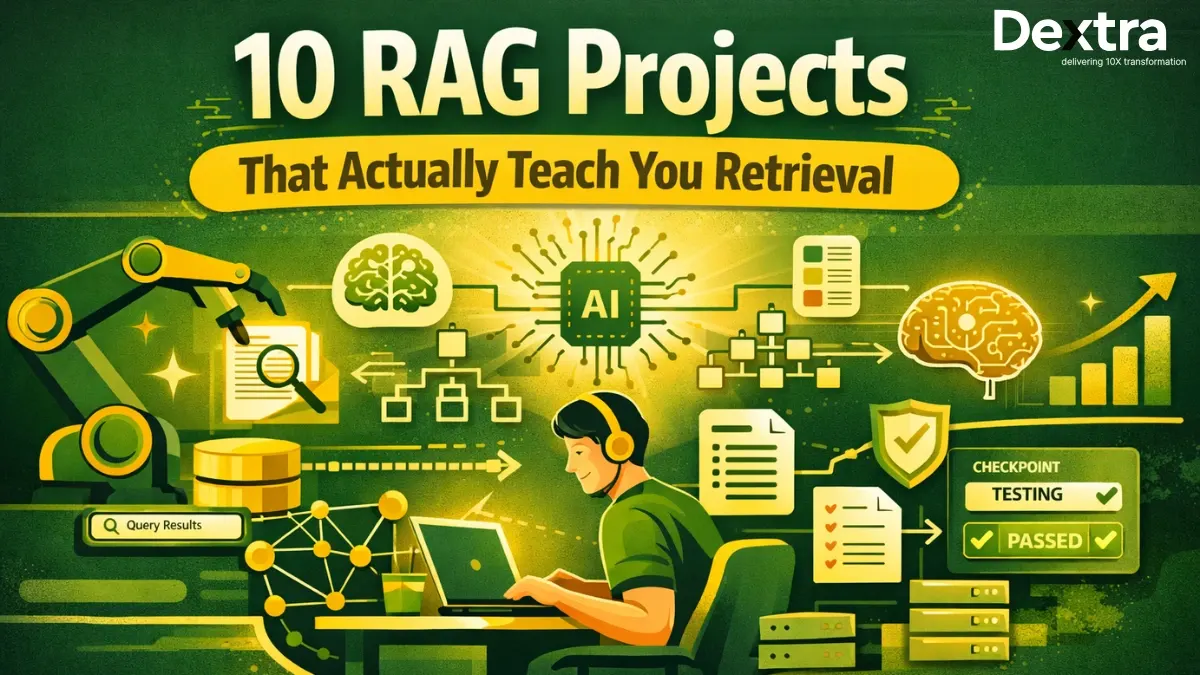Do you use Siri or Alexa to get answers in seconds? Or maybe you’ve chatted with a customer service bot while shopping online? If your answer is yes, you’ve already experienced NLP (Natural Language Processing) in action.
In 2025, Natural Language Processing (NLP) is more than a buzzword. It is a key part of new technology. NLP runs AI agents, powers chatbots, and helps businesses create more personal customer experiences. It also automates work. Because of this, NLP is changing how companies connect, communicate, and grow.
NLP is often called the main part of today’s AI tools. It helps computers understand and use human language. This lets computers read, make sense of, and create language like people do. NLP turns messy data into useful ideas. For example, the global NLP market may grow from $24.10 billion in 2023 to $112.28 billion by 2030, with 24.6% annual growth.
At Dextralabs, we work with startups and enterprises across the USA, UAE, and Singapore, helping them unlock the potential of NLP for business-ready solutions—whether through AI consultancy, AI agent development, or advanced LLM integration.
For visionary entrepreneurs, the main question is not “Should I embrace NLP?” It is “How can I use NLP in a smart way to drive profitable growth and innovation?”
What is Natural Language Processing (NLP)?
Natural Language Processing, or NLP, is a subfield of artificial intelligence that deals with equipping computers to understand, interpret, and generate human language. It’s what enables a computer to not just read words or hear voices but also decipher it and respond accordingly.
If you’re learning NLP basics or would like to know NLP basics, think of it as the technology behind things we already use every day:
- Customer support chatbots
- Voice assistants like Alexa or Siri
- Translation programs like Google Translate
- Spam filters that clean out your inbox
- Recommender systems that let you know what you’ll like next
These are all built on natural language processing fundamentals.
Relation to LLMs & AI Agents
NLP is the foundation for more sophisticated AI systems:
- LLMs (Large Language Models): Advance NLP to the next level by training on huge datasets, so they can respond with fluent, contextually aware answers.
- AI Agents: Use NLP + LLMs with reasoning and automation to transform basic language understanding into decision-making and execution of tasks.
From our AI consulting services at Dextralabs, we’ve learned that:
- Founders gain the most when they consider NLP to be a business enabler, not merely a technical tool.
- NLP has the ability to unlock rich customer insights, streamline workflows, and tailor user experiences.
- Startups that embed NLP strategically tend to grow more quickly and develop more powerful competitive moats.
Why Tech Founders should care about NLP?
For founders, learning the basics of NLP isn’t just about keeping up with AI buzzwords, it’s about achieving real business value. Natural Language Processing basics can have a direct impact on how fast you scale, how effectively you interact with customers, and how effectively you compete.
Why NLP Matters for Founders?
- Scalability: Automates repetitive tasks like customer support, data entry, and content generation.
- Customer Experience (CX): Enables personalized interactions through chatbots, recommendations, and feedback analysis.
- Competitive Edge: Provides actionable insights from unstructured data customer reviews, support tickets, and market chatter.
NLP in Startups vs Enterprises
- Startups: Time is paramount. Light-weight NLP solutions can help founders ship fast, validate product-market fit, and interact with users quickly.
- Enterprises: Scalability and compliance take center stage. NLP solutions need to process humongous volumes of data while maintaining privacy, accuracy, and regulatory compliance.
From Dextralabs LLM consulting work, we’ve seen that successful founders don’t adopt NLP just because it’s “the next big thing.” Instead, they align it with their growth stage and sector-specific needs.
- Early-stage startups: NLP can accelerate MVP development and customer feedback loops.
- Growth-stage companies: NLP enables process automation and market expansion.
- Regulated sectors (like fintech or healthcare): NLP must balance innovation with compliance and trust.
Core NLP Concepts and Methods
When diving into natural language processing fundamentals, it helps to first understand the core NLP methods, techniques, and concepts that power real-world applications. These are the building blocks that transform raw text into insights and actions.
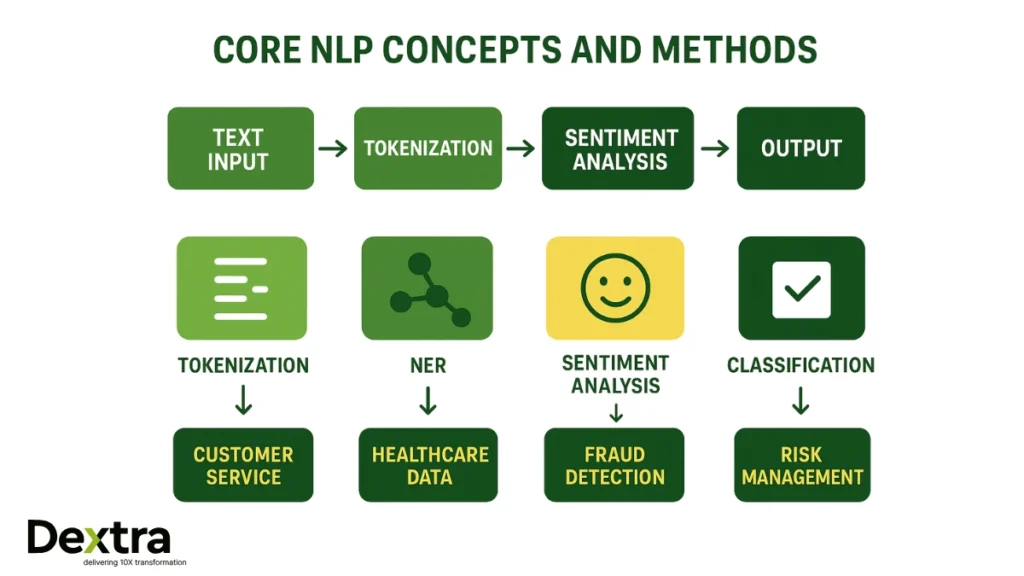
NLP Methods & Techniques
Some of the most widely used natural language processing methods and basic NLP techniques include:
- Tokenization: Splitting text into smaller units (words, subwords, or sentences) for structured analysis.
- Stemming & Lemmatization: Reducing words to their base or root form (e.g., better → good via lemmatization).
- Named Entity Recognition (NER): Identifying names of people, places, organizations, dates, or other key entities.
- Sentiment Analysis: Detecting emotional tone positive, negative, or neutral within text, crucial for customer feedback and brand monitoring.
- Text Classification: Categorizing text into predefined labels, such as spam vs. non-spam, or support ticket type.
These NLP tools and techniques form the practical toolkit that founders and product teams can leverage to build intelligent features into their products.
NLP Fundamentals
In addition to approaches, the underlying NLP fundamentals and NLP concepts supply the basis for sophisticated AI systems:
- Syntax & Semantics: Knowing the composition (grammar) and meaning of sentences.
- Contextual Embeddings: Embedding words in vectors retaining their meaning in context (e.g., bank as a financial institution versus bank of a river).
- Large Language Models (LLMs): Such advanced models like GPT and BERT that build on top of these to generate responses and summaries like humans and to fuel conversational AI.
From our experience in AI consulting, we’ve found that entrepreneurs typically get intimidated by the tech side of NLP. We de-mystify these NLP abstractions at Dextralabs by relating them to real-world business scenarios like:
- Customer Support Automation: Employing text classification and sentiment analysis.
- Fraud Detection: Taking advantage of entity recognition and contextual embeddings.
- Knowledge Management: Using LLMs for summarization and smart search.
This approach helps founders see NLP not just as a technical capability but as a business growth enabler.
Practical NLP Examples
When it comes to real-world adoption, there are plenty of natural language processing examples that show how businesses can unlock value. These NLP examples span industries, proving that language-driven AI is not just a research topic it’s a business growth driver.
Customer Service
- AI Chatbots powered by basic NLP techniques can handle common customer queries instantly.
- Sentiment Analysis helps brands gauge customer emotions in reviews, emails, and chat conversations.
- Outcome: Reduced support costs, faster response times, and improved customer satisfaction.
Healthcare
- RE Medical records summarization using data science NLP techniques enables doctors to access patient history immediately without having to wade through thick documents.
- Outcome: More time for patient care and improved diagnostic accuracy.
Finance
- Fraud Detection detects inappropriate patterns in transactions via entity recognition.
- Compliance Automation confirms communications and documents are compliance compliant.
- Outcome: Lower risk, fewer fines, and faster reporting cycles.
Retail
- Personalized recommendations founded on natural language processing methods analyze past behavior, reviews, and purchases.
- Outcome: Better conversions and higher customer loyalty.
From our llm consulting work, we’ve seen that the most effective NLP deployments are industry-specific. At Dextralabs, we help companies integrate NLP in ways that balance innovation with compliance whether that means training a chatbot that understands domain-specific terms, or building fraud-detection systems that align with financial regulations.
NLP Tools and Libraries for Beginners
If you’re just starting out with NLP for beginners, it can feel overwhelming to choose the right tools. The good news is that today’s ecosystem makes it easier than ever to get hands-on with natural language processing for beginners whether you’re a developer, founder, or data scientist building early prototypes.
Popular Python Libraries
Some of the best starting points for building NLP skills are Python-based libraries:
- NLTK (Natural Language Toolkit): Great for learning basic NLP techniques like tokenization, stemming, and sentiment analysis.
- SpaCy: A production-ready library with fast, efficient pipelines for tasks such as Named Entity Recognition and text classification.
- Hugging Face Transformers: Provides pre-trained Large Language Models (LLMs) like BERT, GPT, and RoBERTa that can be fine-tuned for custom use cases.
Frameworks for Agentic NLP Workflows
When you’re ready to go beyond single tasks and into NLP use cases, frameworks assist you in linking models into workflows:
- LangChain: Well-liked for creating LLM-driven apps with reasoning, retrieval, and automation.
- LangGraph: A more recent framework used for sophisticated, agentic workflows with increased reliability and scalability.
Cloud Platforms
For founders and startups that want enterprise-ready services without heavy setup, cloud platforms offer managed NLP capabilities:
- Google Vertex AI – integrates NLP with broader ML pipelines.
- Azure Cognitive Services – pre-built NLP APIs for sentiment, translation, and summarization.
- AWS Comprehend – NLP service for entity recognition, classification, and topic modeling.
In our Ai & LLM consulting, we often help startups decide between:
- Open-source flexibility (great for experimenting, lower cost, faster prototyping).
- Enterprise-ready platforms (better for scalability, compliance, and integration with existing IT).
The right choice depends on the company’s growth stage, data sensitivity, and regulatory environment.
Best Guides & Learning Path for Tech Founders
For founders, getting into natural language processing for beginners is not about being an AI engineer; it’s about learning enough to make good decisions for your product and business. Here’s a step-by-step NLP learning roadmap designed for tech leaders:
Step 1: Mastering the Fundamentals of NLP
- Learn what NLP is, why it’s important, and where it is used.
- Read about NLP concepts such as tokenization, stemming, and sentiment analysis.
- Recommended: “Speech and Language Processing” by Jurafsky & Martin (intro chapters).
Step 2: Explore Fundamentals & Methods
- Dive deeper into natural language processing fundamentals such as syntax, semantics, and contextual embeddings.
- Understand the distinction between rule-based systems, statistical approaches, and current deep learning methods.
- Recommended:Fast.ai free NLP course, Towards Data Science blog series.
Step 3: Experiment with Tools & Techniques
- Work hands-on with NLP technologies and techniques using Python libraries such as NLTK, SpaCy, or Hugging Face Transformers.
- Experiment with cloud platforms (AWS Comprehend, Azure Cognitive Services) for quick prototyping.
- Recommended: Hugging Face tutorials, Google Cloud Skill Boost Labs.
Step 4: Implement NLP into Business Use Cases
- Chart techniques to industry-specific use cases like customer service chatbots, fraud detection, and personal recommendations.
- Begin small proof-of-concepts to prove ROI before scaling.
- Recommended: NLP case studies in fintech, healthcare, and retail.
Step 5: Scale with LLMs & Agentic AI
- Bridge from basic NLP to advanced Large Language Models (LLMs) and libraries like LangChain or LangGraph.
- Explore agentic flows where models can reason, retrieve, and act as well as comprehend text.
- Recommended: LangChain documentation and AI community sites like r/MachineLearning and Cohere Discord.
At Dextralabs, our LLM consultancy often serves as a connecting point for founders to turn knowledge into action. We help startups:
- Design proof-of-concepts with the right NLP strategies.
- Test with market feedback and real data.
- Scale into compliance-balanced, enterprise-grade NLP systems.
Challenges in Implementing NLP
While the basics of NLP may be simple, taking it to production-grade is full of real-world pitfalls. Founders need to be aware of such pitfalls to avoid wastage of investments and compliance. Key Challenges
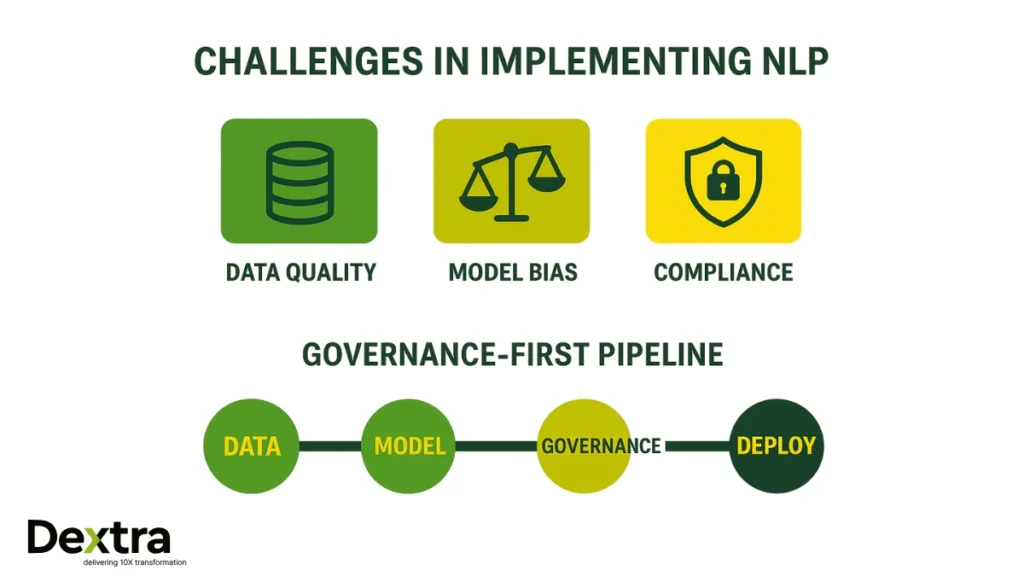
Key Challenges
- Data Quality & Preprocessing:
The quality of the data used to train NLP models determines how good they are. Noisy, inconsistent, biased data can lower accuracy and lead to adverse outcomes. Preprocessing cleaning, tokenizing, and normalizing are often the most expensive steps. - Model Hallucinations & Bias:
Large Language Models can generate realistic but false responses (hallucinations). Bias in training data also enters predictions, impacting fairness and trust specifically in high-stakes domains like hiring or lending. - Regulatory Compliance:
In sectors such as finance and healthcare, strict regulations (GDPR, HIPAA, etc.) mean NLP pipelines must ensure privacy, auditability, and explainability. Scaling innovation without violating compliance methods remains a critical challenge.
At Dextralabs, we focus on building governance-first NLP pipelines. This means:
- Incorporating compliance checks into each phase of the NLP approach.
- Developing explainable and auditable systems.
- Making sure change doesn’t compromise trust or regulatory disclosure.
- By doing so, founders can leverage NLP efficiently without compromising their customers or business credibility.
This approach enables founders to adopt NLP effectively while protecting both their customers and their business reputation.
The Future of NLP for Tech Founders
The aspect of natural language processing is moving fast, and for founders, the next wave of innovation will create both opportunities and competitive pressures. Here are three major directions shaping the future:
1. Multimodal NLP
- NLP is improving beyond text into multimodal systems that combine text, voice, and vision.
- This means founders can build products where users interact naturally typing, speaking, or even uploading an image for contextual answers.
- Example: A healthcare app that analyzes medical reports (text), interprets scans (vision), and takes patient dictation (voice).
2. Integration with AI Agents
- The rise of agentic AI will enable NLP systems to do more than interpret language they’ll take action.
- Instead of just generating a reply, an NLP-powered agent might book a meeting, file a compliance report, or draft legal documentation.
- For founders, this means new opportunities to automate end-to-end methods, not just single tasks.
3. Accessible LLM-driven Frameworks
- LLM-powered NLP frameworks (LangChain, LangGraph, etc.) are making advanced capabilities more accessible to startups.
- What used to require deep ML expertise can now be built with modular frameworks and APIs.
- This lowers the barrier for founders to experiment, prototype, and scale NLP products quickly.
At Dextralabs, we see NLP evolving into collaborative AI ecosystems. Instead of standalone models, the future will be about agents powered by LLMs delivering domain-specific intelligence for both startups and enterprises.
For founders, this means:
- Faster MVPs with plug-and-play frameworks.
- Richer user experiences through multimodal interactions.
- New possibilities for automation, personalization, and compliance-driven change.
Conclusion
NLP is no longer optional for tech founders; it has become a foundation for building competitive products. From automating customer service to powering compliance in regulated industries, the natural language processing fundamentals we’ve inspected show how NLP can deliver both efficiency and change.
The key is to approach NLP with a business-first mindset. It’s not about chasing the latest tools or frameworks; it’s about aligning NLP adoption with your growth stage, industry needs, and customer experience goals.
At Dextralabs, we partner with startups and enterprises in the USA, UAE, and Singapore to design and deploy scalable NLP systems ranging from AI agents to custom LLM integrations.
If you’re exploring NLP, the right partner can help you turn fundamentals into real-world outcomes, transforming ideas into solutions that scale.

